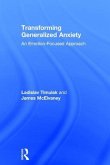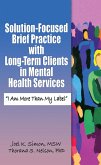CBT for Long-Term Conditions and Medically Unexplained Symptoms describes how Cognitive Behavioural Therapy (CBT) can be used to treat anxiety and depression with a co-morbid long-term physical health condition (LTC), or medically unexplained symptoms (MUS).
Hinweis: Dieser Artikel kann nur an eine deutsche Lieferadresse ausgeliefert werden.
Hinweis: Dieser Artikel kann nur an eine deutsche Lieferadresse ausgeliefert werden.
'Philip and Helen have captured the essence of what it means to work with clients with physical health conditions using cognitive behavioural therapy principles. This book is both topical and comprehensive. You will become immersed in a wealth of knowledge with clinical examples, reminders and summaries of the key messages that we must never forget when engaging with this client group. I will certainly be referring to this book for years to come.'
Chinea Eziefula, Clinical psychologist, Service lead for haematology psychology, Whittington Health; Lead, long-term health conditions, Camden iCope.
'Having worked in the area for 20 years, it is encouraging to see a book that truly reflects the work with this patient group. I think it is a perfect introduction and essential reading for developing skills in working with this client group. The book is written in a clear way that skilfully simplifies adaptations to the basic CBT model for working with people who have long term conditions and / or medically unexplained symptoms. It provides some theoretical background but is largely focused on the CBT techniques in practice. I work largely with patients who have medically unexplained symptoms and really appreciate that this book emphasises the importance of an individualised formulation which informs the treatment approach rather than a standardised protocol approach. I'll be recommending the book to colleagues and new starters in our team.'
Marie Acton, Principal Psychotherapist and Senior Clinical Lead, General Liaison and Huntington's Disease Teams, Department of Psychological Medicine, Humber Teaching NHS Foundation Trust
Chinea Eziefula, Clinical psychologist, Service lead for haematology psychology, Whittington Health; Lead, long-term health conditions, Camden iCope.
'Having worked in the area for 20 years, it is encouraging to see a book that truly reflects the work with this patient group. I think it is a perfect introduction and essential reading for developing skills in working with this client group. The book is written in a clear way that skilfully simplifies adaptations to the basic CBT model for working with people who have long term conditions and / or medically unexplained symptoms. It provides some theoretical background but is largely focused on the CBT techniques in practice. I work largely with patients who have medically unexplained symptoms and really appreciate that this book emphasises the importance of an individualised formulation which informs the treatment approach rather than a standardised protocol approach. I'll be recommending the book to colleagues and new starters in our team.'
Marie Acton, Principal Psychotherapist and Senior Clinical Lead, General Liaison and Huntington's Disease Teams, Department of Psychological Medicine, Humber Teaching NHS Foundation Trust








